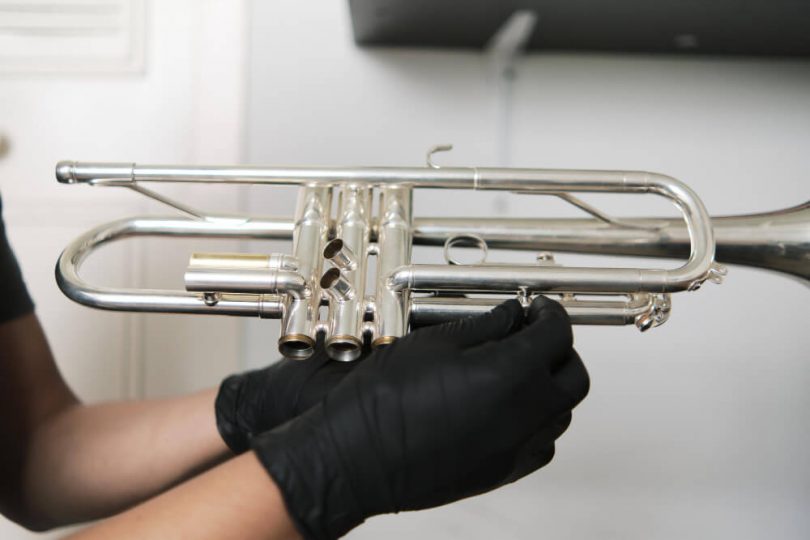Dents can alter brass instruments playability and sound depending on their position and size. Sound quality will be affected more by dents closer to the mouthpiece or source of sound, while dents near the end of the instrument will just detract from its overall aesthetic appeal.
A dent or two is unavoidable, but how do we know if a dent will influence the sound or if it’s just a cosmetic ding? If your instrument has a dent, you should check to see if it will impact the sound.
Does a dent impact the sound of a horn?
Tubas and other large brass instruments, in particular, are prone to being knocked around. Even if you take extra precautions, it’s possible that your instrument will collide with a music stand, door frame, or another instrument while being transported or played.
In order to produce a given sound, brass instruments are intended to bounce sound waves in a specific shape and at a specific rate.
A dent in an instrument’s tubing might prevent sound from bouncing properly because it interferes with its pattern, the placement of the dent on the instrument has a significant impact on how much it interrupts the sound wave. It’s possible that if the dent is in the wrong place, you’ll have problems with tone and intonation.
A typical rule of thumb that many players have followed throughout the years is that the closer a dent is to the mouthpiece, the more harmful it is to the instrument’s sound. This is due to the fact that the dent is located closer to the source of the sound, causing more instant damage.
Having a horn with dents near the mouthpiece or lead pipe will certainly hinder the player’s ability to produce a clear, consistent tone. Also, they can make it more difficult for a brass instrument to “slot,” which is to produce the correct tone.
The horn’s sound will be unaffected if the dent is near the end of the instrument, such as on the bell flare. Aside from dents on the instrument’s body, there are some dents that will leave your horn unplayable entirely. Some of the most evident problems with your horn’s sound and playability include dents in a valve casing or a dented mouthpiece.
Do dents alter the sound of the saxophone?
Although the saxophone is nominally a woodwind instrument, it is constructed of brass and hence experiences dents in the same manner that other brass instruments do.
The same general rule applies to saxophones: dents closer to the mouthpiece are more bothersome. Saxophone sound will be affected by dents on its neck or upper body. Even the tiniest dents on the surface can have a significant impact on the neck’s circumference.
Lower body and bell dents are normally innocuous blemishes, but depending on their size and placement, they can be a problem. Any dent that causes air leakage will alter the sound of a saxophone.
Small dents aren’t generally a problem, but if the tone holes are warped in any way, the key will not seal. The saxophone’s tone holes are where the keys lift. When a key does not seal when pressed down, air leaks out, affecting the saxophone’s playability and sound.
Having a ding in the lower bow of a saxophone can make lower notes either out of tune or impossible to play. Sadly, these kinds of dents on the saxophone are all too prevalent, and they happen all too frequently when the instrument is dropped.
Do dents alter the sound of a trumpet?
Depending on the size and where the dent is positioned, a trumpet’s sound can be affected. The dent has a greater impact on the sound of an instrument the closer it is to the mouthpiece, like with other instruments.
A minor ding on the body of the trumpet will usually have no effect on the sound. The location of the dent is more important than the size of the dent.
A ding in the valve casing of a trumpet, like that of any other brass instrument, must be fixed. These dents will prevent the valve from moving up and down and may cause damage to the valve or prevent it from moving at all.
The lead pipe of the trumpet is the worst location to obtain a dent, and a large one will make it difficult to play the instrument. Some repair shops advise that any dent that protrudes more than 1/3 of the diameter of the tubing may impair the instrument’s playability, sound, and response.
A severe ding or multiple tiny dents will cause the trumpet tubing to become smaller. Changes to the instrument’s air flow are likely to have an impact on how well it performs.
Do dents alter the sound of a trombone or tuba?
Dents in the tuba’s smaller tubing, such as the tuning slides, will have a greater impact on these components. The sound, intonation, or air flow of the instrument will be affected by any dent that considerably reduces the tubing’s size.
The trombone’s primary slide is comprised of two slides: the inner and outer slides. Dents in the trombone can be a serious issue if they occur on any of the two slides.
Slides can’t move easily if they’ve been dented, either on the inside or outside. The trombone will eventually become unusable if dents on either slide are left unrepaired, because trombones have a lengthy, moving slide, dents in the primary slide are a regular occurrence.
Damage to the trombone’s inner or outer slide will impair its sound and should be taken to a repair shop as soon as possible.
Tuba dents are almost unavoidable with an instrument of this size. Even in a single room, carrying a huge piece of brass is a risk. Large dent will almost certainly cause problems with playability and sound, but lesser ones can have a minor effect.
Dents on the tuba’s main bow must typically be quite large or in a specific location to have an effect on the instrument’s sound.
Dents in Brass Instruments
-
Is it possible to repair a dented trumpet? What is the price of this service?
The cost of a basic dent removal is typically less than $50. Repairing an instrument may be more cost-effective in some situations than purchasing a new one.
The degree of difficulty in repairing the trumpet will be directly proportional to the severity of the damage. It’s also important to consider the repair technician’s skill and expertise.
Even the most competent technicians have difficulty removing sharp, wrinkled dents in which the brass folds over on itself. Generally speaking, a professional repair specialist can remove any little ding on a trumpet. Stepping on the instrument, dropping it, or banging it against a music stand are all examples of typical dent types.
When determining whether or not to get a dent removed from your trumpet, cost is a factor. It may not be necessary to repair a small dent if it has no effect on playability or sound, but it will be necessary to address sound-damaging dents.
Student instruments with minor visual flaws are often overlooked. Investing in dent removal may not be worth it if the instrument continues to accrue dings from a young or inexperienced player in the future.
When a lacquer finish is applied to the trumpet, de-denting will alter the appearance of the horn in that area. To re-lacquer the instrument will cost you extra money, but some people enjoy the look it gives to the instrument when the lacquer is partially removed.







